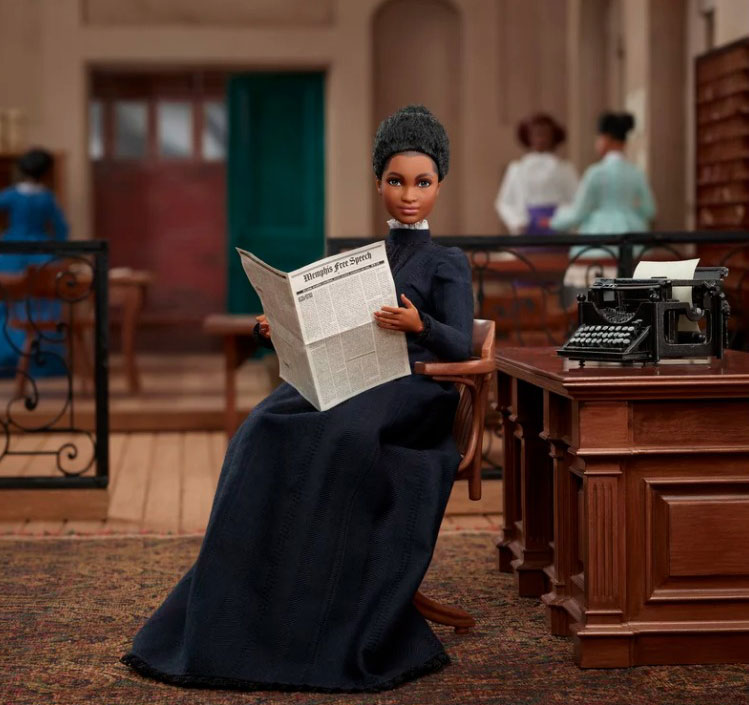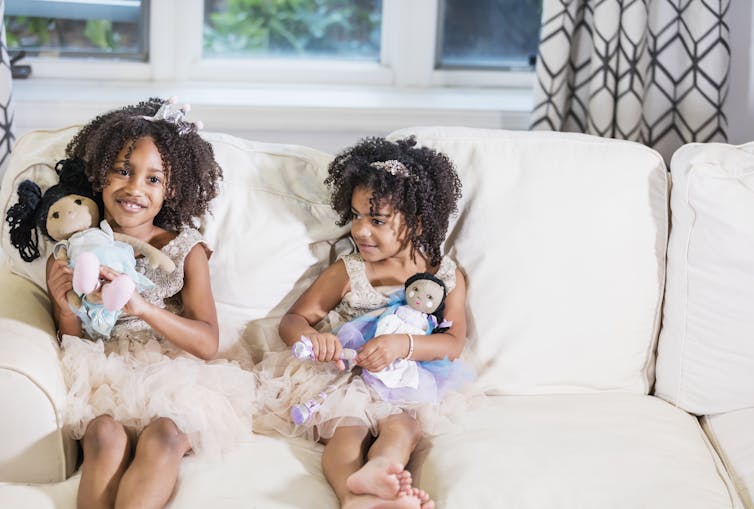
By Toni Sturdivant
When Mattel announced in January 2022 that it was releasing a new Barbie doll to honor Ida B. Wells – the famed 19th-century Black journalist and anti-lynching crusader – the company said the idea was to “inspire us to dream big.” However, while the doll may prove helpful to young Black children, its impact is likely to be limited.
Although diverse groups are sometimes represented accurately within print and digital media, racist portrayals of Black people still persist.
Young Black children can internalize racial messages from a variety of sources, including anti-Black messages from the media, interactions with peers and school practices, such as being disproportionately disciplined or suspended from school. This internalization can negatively impact young children’s feelings about their race and others.
Black dolls, like the one of Wells, can shape the way young Black children understand their identity and affect how they see themselves in society, but only to a limited degree.
From enslavement to journalist
Wells was a noteworthy activist from Holly Springs, Mississippi, who was born into slavery in 1862 and was later emancipated as a child. She attended a segregated Black school and became a teacher in Memphis, Tennessee, until she was fired in 1891 for speaking out against subpar learning conditions. A staunch activist, Wells similarly filed and initially won a lawsuit against the Chesapeake, Ohio & Southwestern Railroad Co. in 1884 after being forced out of a first-class train car despite having purchased a first-class ticket. The ruling was eventually overturned by the Tennessee Supreme Court and spurred the beginning of Wells’ career as a journalist.
Wells wrote about being discriminated against on the train in the Memphis weekly newspaper The Living Way. She became a columnist – writing under the name “Iola” – in 1889. From there, she began to write about lynching, as the part owner and editor of The Memphis Free Speech, a progressive Black newspaper of the time. She eventually organized a major anti-lynching campaign. Her work is a part of how people today know about the terrors of lynching at the turn of the 20th century.
Mixed messages
Having a doll that honors Wells’ legacy can help today’s children “know they have the power” to bring about a better future, an Instagram account for Barbie said in a post. However, the mere existence of a Black doll does not combat anti-Black racism. Representation alone does not equal racial justice or stop messages of anti-Blackness from existing.
Unfortunately, when there are competing narratives about race, children must then make sense of the mixed messages, disregarding some and accepting and internalizing others as they form their own understandings. Therefore, children can benefit from receiving messages that contradict the anti-Blackness that they encounter as they form their opinions about race.
Children learn about race in many places and ways. The media is just one context, and toys represent an overlooked form of media. When it comes to dolls specifically, a wealth of research shows that simply presenting a child with a doll does not mean that they will be interested in it.

kali9/E+ via Getty Images
What children choose
In my research study, I carefully selected two Black dolls, one white Latina doll and a white non-Hispanic doll from the Hearts for Hearts doll line. These dolls piqued the interest of the 4-year-old participants in my study. Out of the 13 children, eight were Black, two were white, one was Latina, and two were Asian.
In seeing the set of dolls as a group, the children could not wait to play with them; but when it came time to play with the dolls, most of the children preferred to play with the non-Black dolls. The children assigned a greater sense of value to the white and Latina dolls and ignored or mistreated the Black dolls.
It turned out the internalized messages of anti-Blackness to which these young children had been exposed led them to play with the dolls that did not look like them. This internalization was apparent in their conversations and my examination of their school curriculum, which included only white or animal protagonists in its collection of children’s books.
For example, conversations between the children during playtime with the dolls revealed that they did not want to play with the Black dolls because of their “big hair” or “curly hair.” When I asked a Black girl if she wanted to play with the only available doll, a Black doll, she shook her head “no.” An Indian American child intervened and stated that she wanted a “long hair” doll. Several children also pretended to lighten the skin color of the Black dolls with makeup.
Through my firsthand experience working with educators who used the curriculum taught to my 4-year-old participants, I am familiar with the absence of Black voices and perspectives within the provided children’s books, which were displayed in the classroom. Given the potential power of children’s books to positively impact their feelings about race, the absence of diverse characters and their perspectives is a critical issue.
While representation is important, combating the anti-Blackness that actively harms Black children is the necessary work.
[Over 150,000 readers rely on The Conversation’s newsletters to understand the world. Sign up today.]
Although the new Ida B. Wells-inspired Barbie doll does come with information about the late journalist, activist and suffragist on its packaging, research suggests that consistently sharing books with children that include characters with relatable lived cultural experiences enables them to link themselves to the presented information. Additionally, seeing themselves positively represented through Black characters and other characters of color fosters a sense of pride and respect for racial difference.
In my view, Wells was a forceful leader and activist who deserves our respect and attention. Mattel’s inclusion of the late journalist in its Inspiring Women Series of Barbie dolls, which spotlights “heroes who paved the way for generations of girls to dream big and make a difference,” is admirable. However, my research demonstrates that it might not resolve the anti-Black messages to which my 4-year-old participants and possibly other children have been exposed.
Toy manufacturers can produce a range of diverse dolls, but if children are not interested in them, their impact is greatly limited.
![]()
Toni Sturdivant is Assistant Professor of Curriculum and Instruction at Texas A&M University-Commerce.





























Jimbo99 says
Hmmmm that’s odd, as far back as I can remember, there has always been a Black Barbie & Ken doll in the USA. The same skinny anorexic Barbie doll model the white kids could buy. Dad got us GI Joe’s with life-like hair. There were even Black GI Joe’s with life-like Afros. Go ahead, Google vintage GI Joe & Barbie dolls. Mattel & Hasbro has always been diverse. Bigots are going to be bigots really, no new doll series is going to change that, it might be more triggering than anything else. If a child wants to become a soldier, model, police officer, they’re going to want the product that most closely approximates their physical appearance & features.
MeToo says
I agree with Jimbo99. There have always been colored & ethnic dolls. I am currently reading the Ida B Wells story and I think having a doll that may inspire others (no matter their color) to learn her story is a great idea.